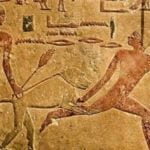 Movies and TV
Movies and TV  Movies and TV
Movies and TV  Creepy
Creepy 10 Eerie & Mysterious Ghosts of the Pacific Coast
 Weird Stuff
Weird Stuff 10 Typos That Accidentally Changed History
 History
History 10 Times Trickery Won Battles
 Technology
Technology 10 Awesome Upgrades to Common Household Items
 Misconceptions
Misconceptions 10 Hilarious (and Totally Wrong) Misconceptions About Childbirth
 Weird Stuff
Weird Stuff 10 Warning Labels That Exist Because Someone Actually Tried It
 Health
Health Ten Confounding New Inventions from the World of Biomedicine
 Creepy
Creepy 10 Death Superstitions That Will Give You the Creeps
 Movies and TV
Movies and TV 10 Movies That Get Elite Jobs Right, According to Experts
 Movies and TV
Movies and TV 10 Most Realistic Medical TV Shows of All Time
 Creepy
Creepy 10 Eerie & Mysterious Ghosts of the Pacific Coast
 Weird Stuff
Weird Stuff 10 Typos That Accidentally Changed History
Who's Behind Listverse?

Jamie Frater
Head Editor
Jamie founded Listverse due to an insatiable desire to share fascinating, obscure, and bizarre facts. He has been a guest speaker on numerous national radio and television stations and is a five time published author.
More About Us History
History 10 Times Trickery Won Battles
 Technology
Technology 10 Awesome Upgrades to Common Household Items
 Misconceptions
Misconceptions 10 Hilarious (and Totally Wrong) Misconceptions About Childbirth
 Weird Stuff
Weird Stuff 10 Warning Labels That Exist Because Someone Actually Tried It
 Health
Health Ten Confounding New Inventions from the World of Biomedicine
 Creepy
Creepy 10 Death Superstitions That Will Give You the Creeps
 Movies and TV
Movies and TV 10 Movies That Get Elite Jobs Right, According to Experts
10 Secular Ways to Appreciate the Bible
The Bible is the number one sold book on the planet and not just because it is important to Christianity; it is also read by secular people for a purely intellectual or entertaining read. This list looks at ten ways the Bible can be appreciated by people who don’t necessarily subscribe to the beliefs of any religion.

Quite a few of the laws God enacts in the Torah make the Jews look rather bad, but that is not a fair view of them. Genesis 6:5 and 6 state, “The Lord saw how great the wickedness of the human race had become on the earth, and that every inclination of the thoughts of the human heart was only evil all the time. The Lord regretted that he had made human beings on the earth, and his heart was deeply troubled.” So it was not just the Israelites, but everyone, with whom God frequently got angry.
There were no laws before God gave them to Moses. So Cain might not have understood why he should not have killed his brother, Abel. Today we know better, primarily because of the Bible. It is the go-to Book for most people when discussing ethics. Not only did God have to command us, “Thou shalt not kill,” he also had to command us, “Neither shalt thou lie with any beast to defile thyself therewith: neither shall any woman stand before a beast to lie down thereto: it is confusion.” He then explains that the Jews are his chosen people, and that they should not do these abominable things, because all the cultures around them are doing them.
Perhaps more than any other book, the Bible teaches anyone who reads just what sort of people we all came from, and what we can expect from our species in general. One on one, most of us are sane and good-natured. But there’s always the chance for a soccer riot, and when this “pack of dogs” mindset crops up, you can expect to see people killed just for the thrill, or the challenge of getting away with it. You can expect rapes and looting. This is who we are in the Bible, and in Revelation, it is who we still are.

Lewis Black once said that the God of the New Testament is a really great guy, especially when compared to the God of the Old Testament, “who…is a prick.” The severity of his anger, the lurid brutality of actions have put more people off Judeo-Christian-Muslim theism than any other reason. But the Bible does make amply clear why God treats his own chosen people as harshly as he does. He explains through multiple prophets, over thousands of years, that whenever bad things happen to the Israelites, they have brought it on themselves, and it is God’s punishment against them.
He also punishes other cultures in the area for worshiping other gods. His punishments are extreme to state the obvious. When Jerusalem sins against him by turning aside after other gods, he declares through Ezekiel that the city will be ransacked by a foreign nation, Babylon. He could destroy Israel as he did Sodom and Gomorrah, but he wants Israel to survive and learn how to be righteous in his eyes. So they are defeated and taken into slavery by Babylon.
God’s methods of instilling discipline in people are difficult to take. But when you were a child, did you love your parents at every moment? It was difficult to understand why these two adults you knew better than any others would take you out for pizza at no charge to you, and an hour later spank you and yell at you for doing something of which they disapproved. And for just a little while, minutes only perhaps, you hated them. You were angry and wished terrible things on them. You said, “I’ll show you. I’ll hold my breath till I die. I’ll never speak to you again.”
Then, the next day, everything was somehow back to normal. Welcome to the Old Testament. The Bible makes it clear many times throughout that this is how we should think of God, as a father figure for all adults. “Honor thy father and thy mother” works for children until they reach the age of self-reliance, after which they should still honor them, or their memories, by raising their own children in the same way, and it also works for adults as an instruction to honor God, everyone’s father.
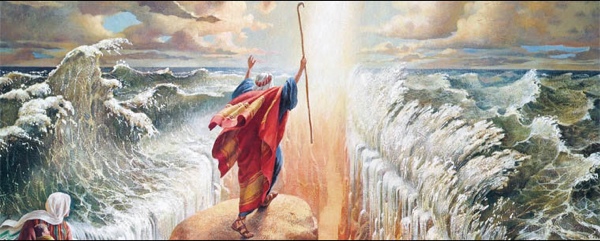
That sounds obvious, but people routinely bring up that God made the rules, whether the laws of physics, or the rules of logic. You name it, God created it, and many theories have been proposed for how God performs the miracles in the Bible (more on that in #5). The parting of the Red Sea might have been caused by the eruption of Santorini, or a freak windstorm. The 10 plagues of Egypt began with the Nile turning to blood. This might have been due to red algae, which kills fish, which float to the surface and draw flies, gnats, and more. The frogs were able to get out of the river.
But this is all to imply that God operates within the confines of Nature, at least as we understand it, according to the rules he created. That is not necessarily true. Ezekiel and some of Paul’s letters emphasize the sovereign will of God, namely that he has the power to do as he pleases, and no one has the slightest right to take issue with him. Job attempts to do so as politely as possible, ranting about why God would let harm befall him when he has done everything right. What is God’s rejoinder? “Where were you when I created the earth? Answer me, if you even know how to.” Job sums this up with, “The Lord giveth, and the Lord taketh away.”
One of God’s most shocking infractions against what we consider the rules takes place when he “hardens Pharaoh’s heart.” This is to say that Pharaoh might have let the Israelites go long before the plague against the firstborn. But God states blatantly at Exodus 14:17, “And I, behold, I will harden the hearts of the Egyptians, and they shall follow them: and I will get me honour upon Pharaoh, and upon all his host, upon his chariots, and upon his horsemen.”
Here, the Egyptians are following the Israelites into the parted Red Sea. How could they be so dumb as to chase after them between the walls of water? Because God made them dumb through anger. We rarely think of God as a braggart seeking fame at all costs, but this story illiustrates just that. Not even free will is immune to his power. How do we reconcile this scene with the merciful, loving persona we have cultivated in him over the millennia? The Bible itself explains that God did this to teach the Egyptians just who is God, that their gods do not exist, that they worship empty idols, and that they had better worship the Hebrew God. It is not a request; it is not a plea; it is the first commandment. And there is no safety in the laws of nature, or physics, or free will, or logic, from God’s will.

The Old Testament is thought by Christians to be incomplete on the subject of the afterlife. If you ask a Jewish person what happens to them after death, they will usually reply with a variation of, “I don’t know. But I will live on in the good works of my children.” Jews do not believe that they will go to Heaven, until after the Messiah has come to grant them admission into Heaven. They believe that Jesus was not the Messiah, since they consider that he did not fulfill several Messianic prophecies.
Christians, however, believe that Jesus is the Messiah, conquered death by his nature as God in the flesh, and by that act gained for everyone who believes in it admission into Heaven. Thus it is obvious why Christians are expected to be unafraid of death, to wit, that there is no such thing for them. The transition from Earth to Heaven may be painful, and will always be a source of grief to someone, but it is just that, a transition, not an end. Christian theology maintains that there is no end to a Christian’s life once s/he is born.
But neither should those who only hold to the teachings of the Old Testament fear death, since if they are right that the Messiah has not yet come, then they go nowhere upon death, neither to Hell, nor to Heaven. The Hebrew word for their destination, if any, is “sheol,” or the “grave.” Here, there is no punishment or reward, until such time as the Messiah does come, fulfills all the prophecies concerning him, and opens the door to Heaven. Hence, all those who died before receive their spirits and go to Heaven or Hell.
The Bible makes abundantly clear in both Testaments that to fear death is insensible, since there is no such thing in the first place. Fear of Hell is completely different.
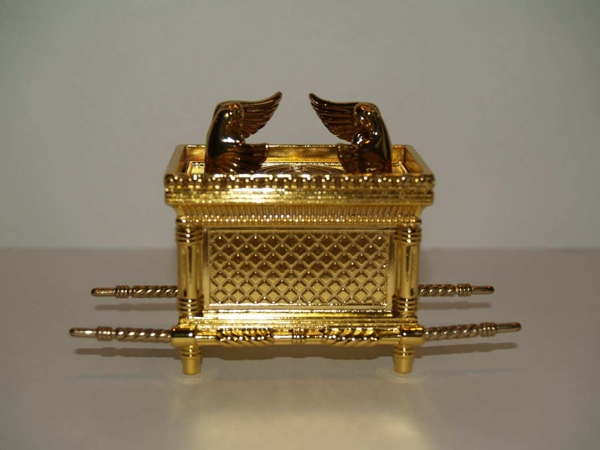
Nikola Tesla was the first to surmise that the Ark was actually a capacitor, which is a storage unit for electricity. Benjamin Franklin was the first to arrange several of these in a row and call the assembly a “battery,” his choice of words, as the extra power reminded him of a battery of cannon. The Ark is first mentioned at Exodus 25:10, at which point God gives very detailed instructions on how to build it.
It is to be built of shittim (acacia) wood, 2.5 cubits long, 1.5 wide, and 1.5 deep. A cubit is the length of the forearm, from the elbow to the middle fingertip. This is usually deemed 18 inches, so the box proper would be about 45 by 27 by 27 inches. God instructs the Israelites to overlay the box, inside and out, with 24-karat gold. They took this gold from the Egyptians. They are then to cover the box with a gold-overlaid lid, with molding and a cherubim “mercy seat,” between the outstretched wings of which God will communicate to Moses.
Now consider the following: gold is the third finest conductor of electricity of all metals, after silver and copper; the Israelites wandered for 40 years in a very dry, windy climate, often very cold at night; the Ark was covered with silk, which rubbed back and forth over it during transit. The result is a metal box that you cannot touch without being shocked. How much voltage it would produce is as easy to answer as constructing one using the Bible’s blueprint.
Various sources agree on an estimate of 1000 volts built up within 1 minute of setting the lid in place, or 1 minute of grounding out through another object, like Uzziah. An electric chair uses about 2,000 volts.
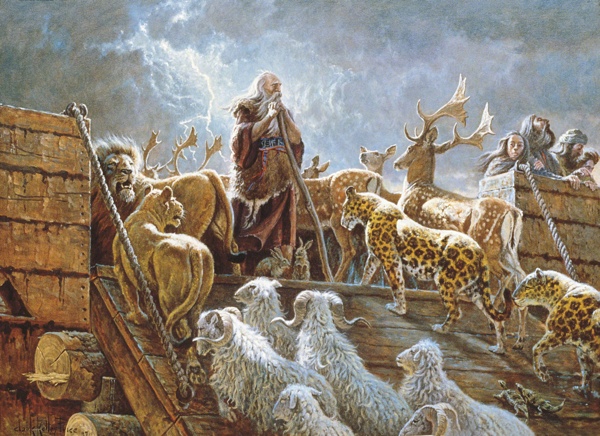
Nevertheless, it is doubtful that such an electric capacitor could knock down the walls of Jericho or stop the flow of Jordan River, so here, divine power must be attributed. Whenever the Bible gives technical details of an event, the question “How?” is usually answerable in a word, “God.”
But if you want a scientific explanation for how Noah got 7 pairs of every clean and 1 pair of every unclean animal into a boat anywhere from 450 to 1000 feet long and 75 to 165 feet wide, the Bible will not give you one. Even if he only saved the species of his area around northern Iran, southern Armenia, and eastern Turkey, there are still too many to fit on the ark. Some theologians have posited that God placed the animals into the fifth dimension for the year-long stay, so they were technically on the ark, but in such a way as to render them invisible or at least out of the way of Noah and his family.
How did Jesus walk on water? A few scientists recently proposed that he was actually standing on a piece of ice that floated him across the Sea of Galilee (Lake Gennesaret, today), given the weather at the time. These scientists immediately received death threats and hate mail. Whether Jesus really did walk on water is a matter of faith in the first place, not just our faith in such an ability, but as an illustration intended to teach us the power of faith. The Bible’s answer for “How?” is simply, “Because He is Jesus.”
The Bible’s stories are, however, meant to teach us the answers to “Why?” Jesus walked on water to teach his Disciples the power of faith. And his lesson worked quite well for Peter, who believed he could as well, based on what he was witnessing. The story teaches us that Jesus never doubts in time of trial, while we do. We get scared, or yield to pain or temptation, and our faith weakens consequently.
How did God create the heavens and the earth in 6 days? Because he is God. Scientifically? Maybe it’s a metaphor for the Big Bang, “day” a metaphor for a few billion years. The Bible leaves this for total conjecture. But why did he do it? The Bible does explain this in many ways. It was his pleasure to do so; he knew it would be good work; he can see to the end of time, and knows the ending will be happy.
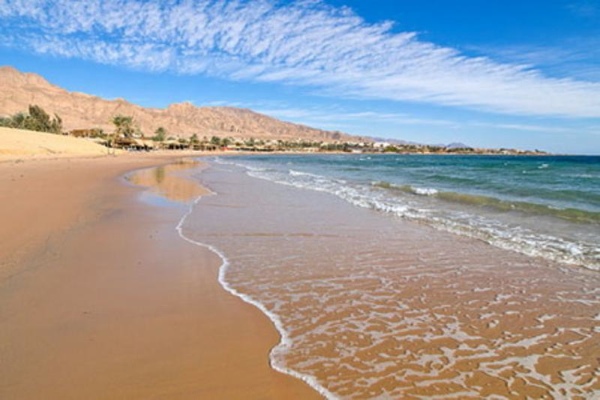
Many times throughout, the Bible offers very specific locations for events, and there has never been any reason to doubt the Book’s accuracy. The site where the Israelites crossed the Red Sea on dry ground is still not known with universal certainty, but the traditional site places it at a point on the present-day Suez Canal. But Exodus 14:2 describes this location quite well, “Tell the Israelites to turn back and encamp near Pi Hahiroth, between Migdol and the sea. They are to encamp by the sea, directly opposite Baal Zephon.” Pi Hahiroth probably means “the mouth of the gorges,” indicating a river which at the time had long since dried up. No dry riverbeds have been found in the area around the Suez Canal. The only bodies of water are the Mediterranean and the Nile. The Red Sea is actually a mistranslation of “Yam Suph,” which means Reed Sea, either a marshy area, or a vaster body of water with reeds along its shores.
So if the Israelites did not cross at the Suez Canal, their flight took them across the Sinai Peninsula to the Gulf of Aqaba, with the Egyptians in hot pursuit. A more fitting site is at modern-day Nuweiba, a resort town on the east coast of the Peninsula. It is the delta plain of an extinct river that flowed through the Sinai mountains. Two prominent peaks rise above the plain, and they match the definitions of Migdol and Baal-Zephon. The former means “tower,” and the latter “Lord of the North,” both of which could well be nicknames of mountains.
A simple Google Earth view of Nuweiba matches everything depicted in the famous scene in Exodus. The delta plain is large enough to accommodate over a million people, and there is a submerged landbridge 90 feet underwater that spans the Gulf for several miles in an east-northeast direction. Walking across the Gulf would still be impossible, were it not for this bridge, given the 2-mile depth at an angle of 70 degrees. At the other side there is a pillar, round and bare, which some have argued was posted there centuries afterward to commemorate the crossing site. Nuweiba may not be the correct site, but it has a better claim based on the Bible’s description of the location.
Moses’s burial site is also given with fair precision in Deuteronomy 34:1-6, in which Moses climbs Mount Nebo, then Pisgah, a different mountain, in Moab to view the Promised Land. Moses dies there and God himself buries him in the valley opposite Beth Peor. “Beth” is Hebrew for “house of,” and “Peor” is the name of a mountain, not Nebo. So Moses climbed two mountains to get a look at Canaan, then died near a third mountain and was buried in a valley that mountain faces.
Today, via oral tradition dating from the events of the Torah, we have a fair idea of which mountain near Nebo and Pisgah is Peor, and it stands at 31 degrees, 48 minutes, 42.75 seconds North, by 35 degrees, 45 minutes, 28.31 seconds East. There is only one valley directly opposite it, and although the Bible states that “to this day no one knows where his grave is,” the fact that we have a good idea of the valley itself is extraordinary in itself.

No less than Aristotle argued that the world, and by extension, the Universe, must have always existed, from eternity; that is, the notion of a time before the Universe and its contents made no sense to him. His view was supported by the intuition of Critolaus and Averroes, among other greats. The Old Testament, however, opens with a definite beginning, a single event in which God says, “Let there be light,” and there was light. Today, we know that the Universe most likely began from a single, infinitesimally small point which contained all the matter and energy the Universe has while you’re reading this list.
The Old Testament is still our main source of information for the history of ancient Israel, from about 1200 BC on. The Bible gives no dates, but traditional conjecture centers on the 1300s to 1200s for the events of the Exodus and Jewish re-inhabitation of Canaan. David was anointed king in about 1002 over the united Kingdom of Israel. His reign is mentioned by a stone tablet discovered in 1993 in Tel Dan, dating from about 870 to 750 BC. This lends strong credence to the Bible’s narrative of Israeli history. There was a Dvid, who was king at about the traditional date.
Noah’s Flood was apparently a worldwide event, as many cultures from that time around the world corroborate it, including the Ninevites, the Epic of Gilgamesh, accounts of the Kiche, Mayans, Indians, and even a few native American tribes, all dating roughly to 8000 BC. This comes close to a theory of a bolide impact in about 7640, plus or minus 200 years. The bolide is believed to have caused a universal deluge.
It is fair to turn to the Bible first in order to learn about Israeli royal lineages, battles, invasions, dispersions, subjugations. The Books of Nehemiah and Daniel provide excellent sources of information on the 586 BC Babylonian sacking of Jerusalem and destruction of Solomon’s Temple, and Jewish life in Babylonian exile. Daniel’s depiction of King Belshazzar is supported by the Nabonidus Cylinder, found in 1881, which mentions Belshazzar reigning at around the same time. Daniel’s account of the Persian conquest of Babylon and the death of Belshazzar is corroborated independently by Persian records.

The Bible is a classic, just like the Divine Comedy or King Lear. Admit it: believer or not, you’re entertained by this story or that. The Bible is loaded with excitement, sex, war, love, and along the way, you’re almost unaware that you’re being taught ethics, history, poetry, prose, and more. Frankly, we remember the bad moments better than the good, but that’s the way it is with literature. What is the first thing you remember about Hugo’s Notre Dame de Paris? Quasimodo dies at the end, and not happily. What is the first thing you remember about Jesus? He gets tortured to death. And neither of them did anything wrong, at least as the authors of the literature present them.
Much of Western literature draws heavily on the Bible for inspiration, not necessarily in direct retellings, but in general character similarities, storylines, principles of ethics. The Lion, the Witch, and the Wardrobe is a reworking of the Gospels. So is The Matrix trilogy. Paradise Lost is an in-depth analysis of Christian theology and the character of Satan via a fictional rendering of the war in Heaven and life in the Garden of Eden. All the famous literary superheroes or villains who possess superhuman strength but one simple weakness, like Superman and Bane, are inspired by Samson, who acquired supernatural strength directly from God, but lost it when his hair was cut.
The Book of Job, as poetry, is held in as high esteem by literary critics as Shakespeare’s best work. Its author is referred to as “the Shakespeare of the Bible.” Whoever wrote the Torah, whether Moses or committee, has been referred to as “the Charles Dickens of the Bible,” for the brilliantly exhilarating narratives throughout Genesis, and the single high-adventure storyline of the Exodus.

The second-to-last lesson the Bible teaches is the importance of forgiveness. We do not get much of it at all until the Gospels, in which Jesus impresses on his Disciples, all the people of the time, and everyone forever after, the logical brilliance inherent in what the King James translation calls “lovingkindness,” a refusal to hold grudges, a desire to repair relationships, make and remain friends with anyone. In a word, “forgiveness” is the thesis of the New Testament. For Christians, at least, John 3:16 is the culminating verse of the entire Bible, the one on which all other verses comment. Despite all man’s imperfections, shortcomings, idiocy, pride, self-righteousness, and defiance against God’s law in the Old Testament, God still takes it upon himself to die as a replacement for man’s death through sin. This is God’s forgiveness of us.
Jesus teaches the crowds time and again that they should love one another; and forgiving any and all transgressions is what it means to Jesus to love. When Peter asks him, “How many times must I forgive my brother if he asks for it? Seven times?” he sounds as if he is reluctant to forgive, as if he would rather hold a grudge and hate someone for an offense, because it’s easier that way. Jesus tells him, “Not seven, but seventy times seven times!” He is not being literal here, but means that we should forgive one another infinitely provided that forgiveness is asked. This is the trick.
Many critics of this concept point out that forgiving someone as a rule invalidates the forgiveness, since it no longer means anything. But the Bible never says to do this. Jesus always describes forgiveness as being asked for, then given. If someone sins against you and does not ask for forgiveness, you are under no obligation to give it. Nevertheless, if they ask for it insincerely, you still forgive them, and you are not the fool, but good and generous. The sin then rests on them.





